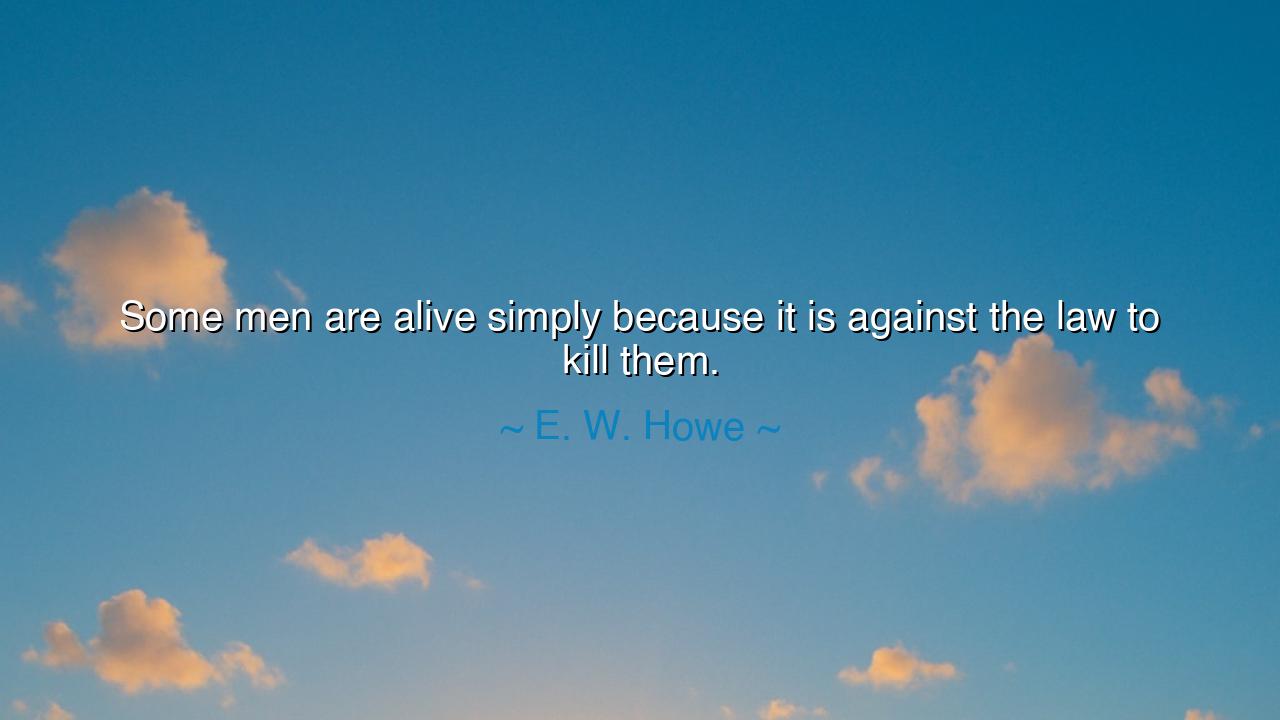
Some men are alive simply because it is against the law to kill






“Some men are alive simply because it is against the law to kill them.” Thus wrote E. W. Howe, the sharp-witted American journalist and essayist of the 19th century, a man who saw the world with both humor and piercing clarity. Beneath the sting of his irony lies not cruelty, but a deep reflection on human nature. In this sentence, Howe does not call for violence—he exposes the reality that there are people whose existence is sustained not by virtue, compassion, or respect, but merely by the boundaries of law and the restraint of others’ morality. It is a bitter truth wrapped in satire: that some live not because they are loved, but because society forbids the hand of vengeance.
Howe’s time was one of sharp contrasts—of progress and hypocrisy, of social advancement and moral decay. As an observer of humanity, he understood that civilization is a fragile thing, held together not by universal goodness, but by rules that prevent chaos. His words reveal the tension between justice and mercy, between what men deserve and what society allows. For even in an age of laws and reason, there exist those whose actions, cruelty, or deceit earn them the silent hatred of others. And yet, because we live in a world governed by order, they walk among us—untouched, unharmed, and unrepentant.
In this, Howe confronts the eternal paradox of the human heart. The ancients spoke often of justice as both divine and human. The Greeks feared Nemesis, the goddess who punished arrogance and wickedness; the Romans trusted their laws to restrain passion; and the prophets of old warned that vengeance belongs to God alone. What Howe’s quote reminds us of is the delicate line between civilization and savagery. The law is not just a system of governance—it is a barrier against our baser instincts. It keeps wrath from devouring reason, and prevents righteous anger from descending into bloodshed. Those who live “simply because it is against the law to kill them” are proof that justice is not always the same as peace.
Consider the story of Joseph Stalin, whose reign over the Soviet Union brought suffering to millions. Many longed to see him fall, yet he died in his bed, old and unpunished. History records countless such men—tyrants, abusers of power, betrayers of trust—who escaped judgment in life. Their survival mocks the moral order, yet it also tests it. For if the righteous were to abandon restraint, the world would collapse into revenge and chaos. Howe’s irony, therefore, is a warning as much as an observation: the existence of evil men challenges our capacity for discipline, and reveals the strength—or weakness—of our civilization.
The meaning of Howe’s words extends beyond their cynicism. They reveal that laws, for all their imperfection, are among humanity’s greatest achievements. The instinct to destroy what is harmful is as old as the blood that runs through us; yet the choice to spare, even when rage burns within, is the mark of wisdom. To obey the law is not merely to follow rules—it is to preserve the very fabric that separates man from beast. Those who resist the urge to destroy those who wrong them embody not cowardice, but strength. For to act in fury is easy; to endure in silence, guided by principle, is divine.
Still, there is another layer to Howe’s insight—one that demands introspection. For every man who reads this quote must ask himself: am I one of those “alive only because it is against the law to kill me”? Do I live in such a way that others must tolerate me merely because they cannot act against me? Howe’s satire is a mirror, and its reflection can burn. It reminds us that to live rightly is not simply to survive, but to earn our place among others, through decency, humility, and grace.
And so, the lesson is this: let your life be worthy of peace, not merely protected by law. Live so that others bless your presence rather than endure it. Do not rely upon the world’s restraint for your safety—rely upon your own goodness for your honor. Be a person whose life brings calm rather than bitterness, kindness rather than contempt. Challenge injustice, but do not become injustice in the process. Remember that even in a world of cruelty, it is mercy—and not vengeance—that sustains civilization.
For in the end, Howe’s bitter truth holds a brighter reflection: the same law that shields the unworthy also protects the righteous. It gives time for repentance, and space for compassion. So let us uphold the law not out of fear, but out of reverence—for it is the shield that keeps our hands clean, our hearts uncorrupted, and our world from devouring itself. Some men live only because it is against the law to kill them—but the wise live because they have learned to forgive.






AAdministratorAdministrator
Welcome, honored guests. Please leave a comment, we will respond soon